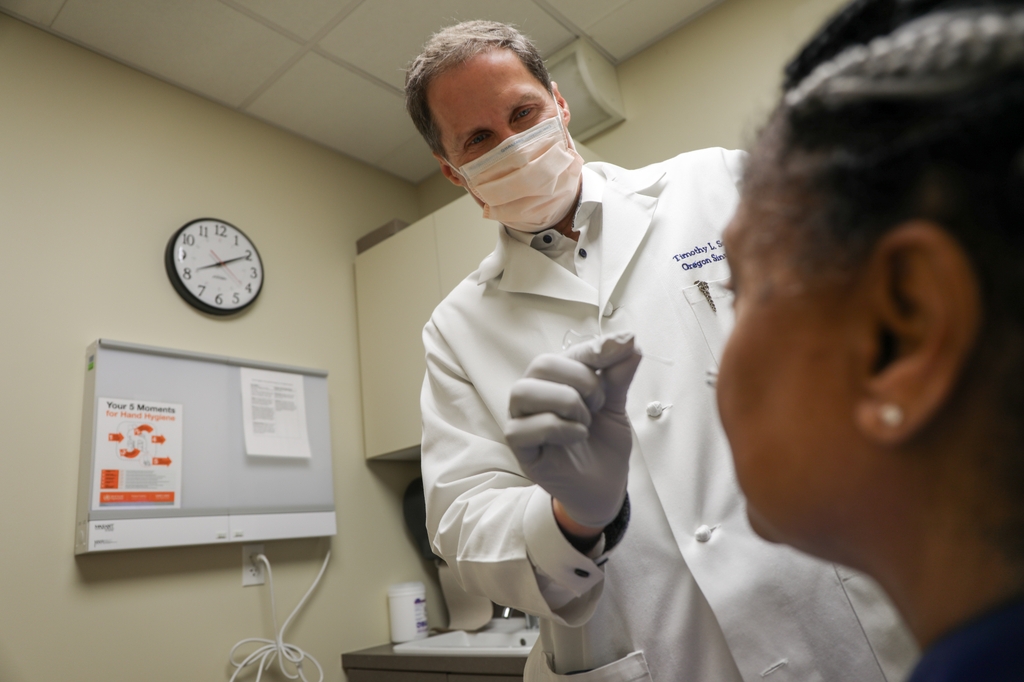
Oregon Health & Science University will use $7 million in new federal research funding to study new medical treatments for chronic sinusitis with nasal polyps, a disease historically treated with steroids or surgery.
Persistent inflammation of the sinuses – a condition that affects millions of people, or about 10% of the adult population in the U.S. – lasts for long periods of time. It is most common in adults ages 40 to 60, and symptoms include sinus pain, nose stuffiness and loss of smell. Traditionally, the condition has been treated with steroids or sometimes surgery.
Since 2019, three new biologics, drugs made from living organisms, have been approved for treatment of the disease, giving people safer options without the side effects of long-term steroid use.

Timothy Smith, M.D., M.P.H., professor and interim chair of otolaryngology/head and neck surgery in the OHSU School of Medicine, is the principal investigator on the grant awarded in April by the National Institute of Allergy and Infectious Diseases of the National Institutes of Health. Smith and colleagues at OHSU's Oregon Sinus Center will lead the project.
"The problem with steroids is it's a shotgun approach," he said. "These new drugs are much more targeted and don't have the safety concerns of steroids."
The oldest of the three biologics, Dipilumab, has been on the market a relatively short time – since 2019. While all three drugs have shown effectiveness in clinical trials, there have been no direct comparisons among the drugs to see which is more effective for what type of patient, so clinicians often just pick one.
"These are very costly medications, in the range of $3,000 to $4,000 per month," Smith said. "The health system and patients cannot afford to rotate through these medicines just to find out that potentially none of the drugs work."
Smith said the goal of the project is two-fold. First, the researchers will conduct a randomized trial of about 500 people with chronic sinusitis with nasal polyps to see if there is a difference in effectiveness among drugs. Second, the investigators will sample and analyze the mucus from participants' sinuses before they randomize them to see whether the inflammatory proteins in the mucus make it easier to predict which drug is most effective.
"Ideally, we'd get to a place where clinicians do this mucus sample before they prescribe a medication," Smith said. "None of that testing is happening now. Clinicians just pick a drug and hope that it works on that specific patient."
Smith said it's possible the trial may be expanded beyond the three biologics currently on the market. He said more than 30 biologic drugs for chronic sinusitis with polyps are being studied right now, each aiming at different inflammatory proteins in the sinuses.
OHSU researchers Kara Detwiller, M.D., Shyam Joshi, M.D., Mat Geltzeiler M.D., and Jess Mace, M.P.H., are co-investigators on the grant. In addition to OHSU, the clinical trial will take place at seven other academic health centers: Vanderbilt University, Johns Hopkins, UCLA, Medical University of South Carolina Medical Center, Mayo Clinic, Brigham and Women's Hospital, and the University of Florida.
The grant is awarded by the National Institute of Allergy and Infectious Disease, of the National Institutes of Health, under award number U01AI181696. The content is solely the responsibility of the authors and does not necessarily represent the official views of the NIH.






